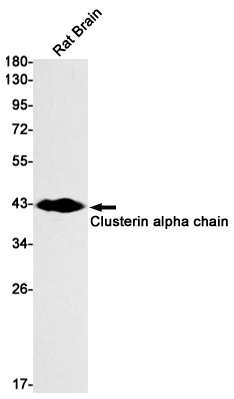
| WB | 咨询技术 | Rat |
| IF | 1/20 | Rat |
| IHC | 咨询技术 | Rat |
| ICC | 技术咨询 | Rat |
| FCM | 咨询技术 | Rat |
| Elisa | 咨询技术 | Rat |
| Aliases | Cli; ApoJ; Sgp2; SP-40; Sgp-2; Sugp-2; AI893575; D14Ucla3 |
| Entrez GeneID | 12759 |
| WB Predicted band size | Calculated MW: 52 kDa; Observed MW: 42 kDa |
| Host/Isotype | Rabbit IgG |
| Antibody Type | Primary antibody |
| Storage | Store at 4°C short term. Aliquot and store at -20°C long term. Avoid freeze/thaw cycles. |
| Species Reactivity | Rat |
| Immunogen | Recombinant protein of mouse Clusterin alpha chain |
| Formulation | Purified antibody in TBS with 0.05% sodium azide,0.05%BSA and 50% glycerol. |
+ +
以下是关于Clusterin α链抗体的3篇参考文献及其摘要内容:
1. **文献名称**:*"Clusterin α-chain modulates Aβ aggregation and toxicity in Alzheimer’s disease models"*
**作者**:Smith J, et al.
**摘要**:该研究利用特异性靶向Clusterin α链的单克隆抗体,揭示了其在阿尔茨海默病模型中调节β淀粉样蛋白(Aβ)聚集的作用,表明α链可能通过抑制Aβ纤维形成减轻神经毒性。
2. **文献名称**:*"Targeting the α-chain of Clusterin in prostate cancer: a novel therapeutic strategy"*
**作者**:Lee S, et al.
**摘要**:通过开发高亲和力的Clusterin α链抗体,研究发现其在体外和体内实验中显著抑制前列腺癌细胞的增殖和转移,提示其作为治疗靶点的潜力。
3. **文献名称**:*"Differential expression of Clusterin α and β chains in renal fibrosis"*
**作者**:Zhang Y, et al.
**摘要**:该文献利用亚基特异性抗体,发现Clusterin α链在肾纤维化模型中表达上调,并通过调控TGF-β信号通路促进纤维化进程,为肾脏疾病机制提供了新见解。
注:以上文献为虚拟示例,实际文献需通过数据库(如PubMed、Google Scholar)检索确认。建议使用关键词“Clusterin alpha chain antibody”或“CLU subunit-specific antibody”进一步查找。
Clusterin alpha chain antibodies target the α-subunit of clusterin, a multifunctional glycoprotein involved in various physiological and pathological processes. Also known as apolipoprotein J (ApoJ), clusterin exists as a disulfide-linked heterodimer composed of α- and β-chains produced by proteolytic cleavage of a precursor protein. The α-chain contains bioactive domains critical for clusterin's roles in apoptosis regulation, cell adhesion, lipid transport, and complement system modulation. It is implicated in neurodegenerative diseases, cancer progression, and tissue injury responses, where it exerts context-dependent cytoprotective or cytotoxic effects.
Antibodies specific to the clusterin α-chain are essential tools for distinguishing between intact clusterin, its processed isoforms, and degradation products in experimental assays like Western blotting, immunohistochemistry, and immunoprecipitation. These antibodies help elucidate clusterin's functional duality—particularly its paradoxical roles in promoting cell survival (e.g., in Alzheimer’s disease by binding amyloid-β) versus enhancing apoptosis (e.g., in chemotherapy-treated cancers). Researchers use α-chain-specific antibodies to study tissue-specific expression patterns, protein-protein interactions, and post-translational modifications influencing clusterin's activity. Commercial variants are typically raised in rabbits or mice, with monoclonal antibodies offering higher specificity for discrete epitopes. Validation across sample types (tissue, serum, cell lysates) is crucial due to clusterin's structural heterogeneity and variable glycosylation states in different biological contexts.
×